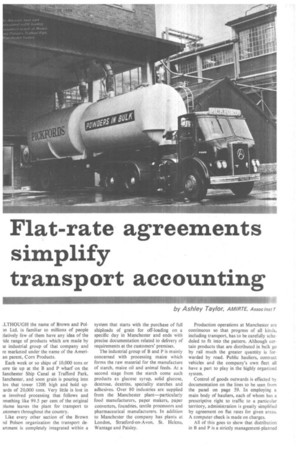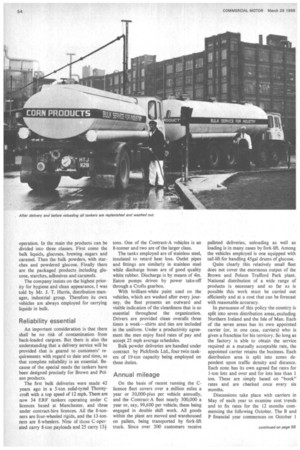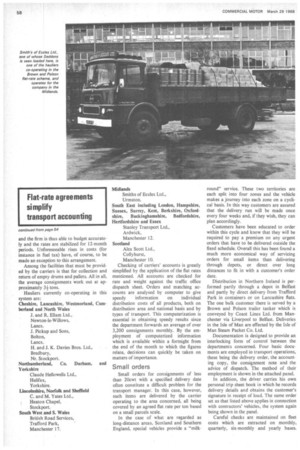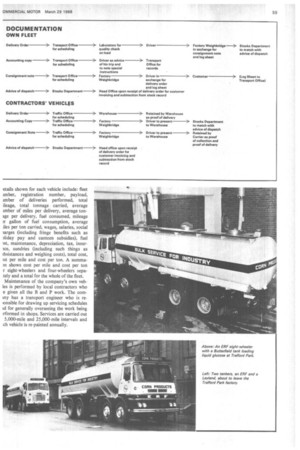Flat-rate agreements simplify transport accounting
Page 51

Page 52

Page 56

Page 57

If you've noticed an error in this article please click here to report it so we can fix it.
by Ashley Taylor, AM/RTE. Assoc lnst T
.LTHOUGH the name of Brown and Pol)n Ltd. is familiar to millions of people latively few of them have any idea of the ide range of products which are made by ie industrial group of that company and re marketed under the name of the Amenan parent, Corn Products.
Each week or so ships of 10,000 tons or lore tie up at the B and P wharf on the Ianchester Ship Canal at Trafford Park, lanchester, and soon grain is pouring into los that tower 120ft high and hold upards of 20,000 tons. Very little is lost in ie involved processing that follows and mething like 99.5 per cent of the original Dlume leaves the plant for transport to Istomers throughout the country.
Like every other section of the Brown nd Poison organization the transport deartment is completely integrated within a
system that starts with the purchase of full shiploads of grain for off-loading on a specific day in Manchester and ends with precise documentation related to delivery of requirements at the customers' premises.
The industrial group of B and P is mainly concerned with processing maize which forms the raw material for the manufacture of starch, maize oil and animal feeds. At a second stage from the starch come such products as glucose syrup, solid glucose, dextrose, dextrins, speciality starches and adhesives. Over 80 industries are supplied from the Manchester plant—particularly food manufacturers, paper makers, paper converters, foundries, textile processors and pharmaceutical manufacturers. In addition to Manchester the company has plants at London, Stratford-on-Avon, St. Helens, Wantage and Paisley.
Production operations at Manchester are continuous so that progress of all kinds, including transport, has to be carefully scheduled to fit into the pattern. Although certain products that are distributed in bulk go by rail much the greater quantity is forwarded by road. Public hauliers, contract vehicles and the company's own fleet all have a part to play in the highly organized system.
Control of goods outwards is effected by documentation on the lines to be seen from the panel on page 59. In employing a main body of hauliers, each of whom has a prescriptive right to traffic to a particular territory, administration is greatly simplilied by agreement on flat rates for given areas. A computer check is made on charges.
All of this goes to show that distribution in B and P is a strictly management-planned operation. In the main the products can be divided into three classes. First come the bulk liquids, glucoses, brewing sugars and caramel. Then the bulk powders, with starches and powdered glucose. Finally there are the packaged products including glucose, starches, adhesives and caramels.
The company insists on the highest priority for hygiene and clean appearance, I was told by Mr. J. T. Harris, distribution manager, industrial group. Therefore its own vehicles are always employed for carrying liquids in bulk.
Reliability essential
An important consideration is that there shall be no risk of contamination from back-loaded cargoes. But there is also the understanding that a delivery service will be provided that is geared to customers' requirements with regard to date and time, so that complete reliability is an essential. Because of the special needs the tankers have been designed precisely for Brown and Poison products.
The first bulk deliveries were made 42 years ago in a 5-ton solid-tyred Thornycroft with a top speed of 12 mph. There are now 34 ERF tankers operating under C licences based at Manchester, and three under contract-hire licences. All the 8-tonners are four-wheeled rigids, and the 13-tonners are 8-wheelers. Nine of those C-operated carry 8-ton Payloads and 25 carry 13+ tons. One of the Contract-A vehicles is an 8-tonner and two are of the larger class.
The tanks employed are of stainless steel, insulated to retard heat loss. Outlet pipes and fittings are similarly in stainless steel while discharge hoses are of good quality white rubber. Discharge is by means of 4in. Eaton pumps driven by power take-off through a Crofts gearbox.
With brilliant-white paint used on the vehicles, which are washed after every journey, the fleet presents an outward and visible indication of the cleanliness that is so essential throughout the organization. Drivers are provided clean overalls three times a week—shirts and ties are included in the uniform. Under a productivity agreement the men enjoy fixed rates of pay and accept 25 mph average schedules.
Bulk powder deliveries are handled under contract by Pickfords Ltd., four twin tankers of 19-ton capacity being employed on these duties.
Annual mileage
On the basis of recent running the Clicence fleet covers over a million miles a year or 30,000-plus per vehicle annually, and the Contract-A fleet nearly 300,000 a year or, say, 99,600 per vehicle, these being engaged in double shift work. All goods within the plant are moved and warehoused on pallets, being transported by fork-lift truck. Since over 300 customers receive palleted deliveries, unloading as well as loading is in many cases by fork-lift. Among the vehicles employed is one equipped with tail-lift for handling 45 gal drums of glucose.
Quite clearly this relatively small fleet does not cover the enormous output of the Brown and Poison Trafford Park plant. National distribution of a wide range of products is necessary and so far as is possible this work must be carried out efficiently and at a cost that can be forecast with reasonable accuracy.
In pursuance of this policy the country is split into seven distribution areas, excluding Northern Ireland and the Isle of Man. Each of the seven areas has its own appointed carrier (or, in one case, carriers) who is given a franchise for his territory. So long as the factory is able to obtain the service required at a mutually acceptable rate, the appointed carrier retains the business. Each distribution area is split into zones dependent upon traffic density and distance. Each zone has its own agreed fiat rates for 1-ton lots and over and for lots less than 1 ton. These are simply based on "book" rates and are checked once every six months.
Discussions take place with carriers in May of each year to examine cost trends and to fix rates for the 12 months commencing the following October. The B and P financial year commences on October 1 and the firm is thus able to budget accurately and the rates are stabilized for 12-month periods. Unforeseeable rises in costs (for instance in fuel tax) have, of course, to be made an exception to this arrangement.
Among the facilities that must be provided by the carriers is that for collection and return of empty drums and pallets. All in all, the average consignments work out at ap proximately tons.
Hauliers currently co-operating in this system are: Cheshire, Lancashire, Westmorland, Cum berland and North Wales J. and R. Ellam Ltd., Newton-le-Willows, Lancs.
J. Pickup and Sons, Bolton, Lancs.
H. and J. K. Davies Bros. Ltd., Bredbury, Nr. Stockport.
Northumberland, Co. Durham, and Yorkshire Claude Hellowells Ltd., Halifax, Yorkshire.
Lincolnshire, Norfolk and Sheffield C. and M. Yates Ltd., Heaton Chapel, Stockport.
South West and S. Wales British Road Services, Trafford Park, Manchester 17. Midlands Smiths of Eccles Ltd,, Urmston.
South East including London, Hampshire, Sussex, Surrey, Kent, Berkshire, Oxfordshire, Buckinghamshire, Bedfordshire, Hertfordshire and Essex Stanley Transport Ltd., Ardwick, Manchester 12.
Scotland Alex Scott Ltd., Collyhurst, Manchester 10.
Checking of carriers' accounts is greatly simplified by the application of the flat rates mentioned. All accounts are checked for rate and weight against the traffic office dispatch sheet. Orders and matching accounts are analysed by computer to give speedy information on individual distribution costs of all products, both on distribution area and national basis and by types of transport. This computerization is essential in obtaining speedy results since the department forwards an average of over 3,200 consignments monthly. By the employment of computerized information which is available within a fortnight from the end of the month to which the figures relate, decisions can quickly be taken on matters of importance.
Small orders
Small orders for consignments of less than 20cwt with a specified delivery date often constitute a difficult problem for the transport manager. In this case, however, such items are delivered by the carrier operating to the area concerned, all being covered by an agreed flat rate per ton based on a small parcels scale.
In the case of what are regarded as long-distance areas, Scotland and Southern England, special vehicles provide a "milk
round" service. These two territories are each split into four zones and the vehicle makes a journey into each zone on a cyclical basis. In this way customers are assured that the delivery run will be made once every four weeks and, if they wish, they can plan accordingly.
Customers have been educated to order within this cycle and know that they will be required to pay a premium on any urgent orders that have to be delivered outside the fixed schedule. Overall this has been found a much more economical way of servicing orders for small items than delivering through depots, or direct over long distances to fit in with a customer's order date.
Distribution in Northern Ireland is performed partly through a depot in Belfast and partly by direct delivery from Trafford Park in containers or on Lancashire flats. The one bulk customer there is served by a Brown and Poison trailer tanker which is conveyed by Coast Lines Ltd. from Manchester via Liverpool to Belfast. Deliveries in the Isle of Man are effected by the Isle of Man Steam Packet Co. Ltd.
Documentation is designed to provide an interlocking form of control between the departments concerned. Four basic documents are employed in transport operations, these being the delivery order, the accounting copy, the consignment note and the advice of dispatch. The method of their employment is shown in the attached panel.
In addition, the driver carries his own personal trip sheet book in which he records delivery details and obtains the customer's signature in receipt of load. The same order set as that listed above applies in connection with contractors' vehicles, the system again being shown in the panel.
Careful checks are maintained on fleet costs which are extracted on monthly, quarterly, six-monthly and yearly bases.
etails shown for each vehicle include: fleet Jmber, registration number, payload, Amber of deliveries performed, total ileage, total tonnage carried, average Imber of miles per delivery, average tonage per delivery, fuel consumed, mileage :a. gallon of fuel consumption, average iles per ton carried, wages, salaries, social targes (including fringe benefits such as )liday pay and canteen subsidies), fuel nt, maintenance, depreciation, tax, insurice, sundries (including such things as Lbsistances and weighing costs), total cost, )st per mile and cost per ton. A summaxi shows cost per mile and cost per ton
✓ eight-wheelers and four-wheelers sepately and a total for the whole of the fleet. Maintenance of the company's own vehles is performed by local contractors who e given all the B and P work. The cornmy has a transport engineer who is reonsible for drawing up servicing schedules id for generally overseeing the work being rformed in shops. Services are carried out 5,000-mile and 25,000-mile intervals and ch vehicle is re-painted annually.
























































































































